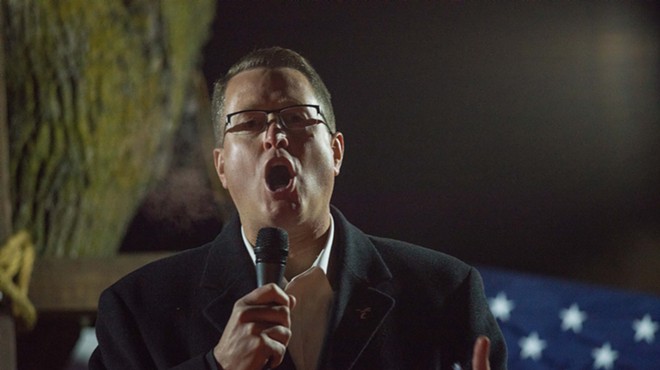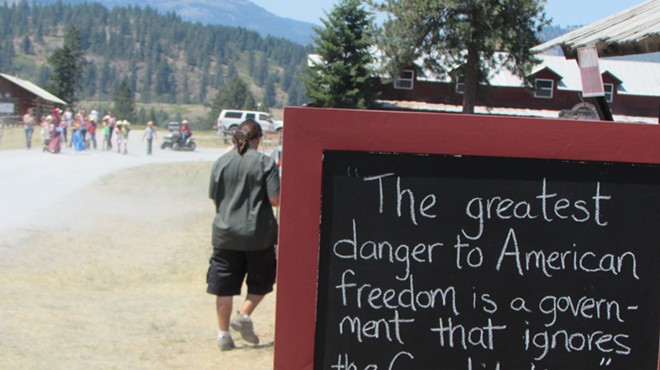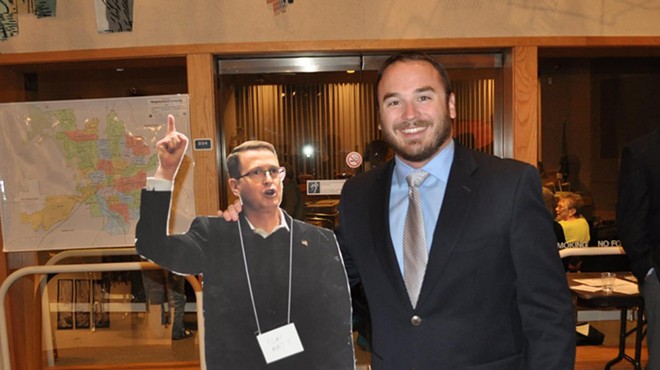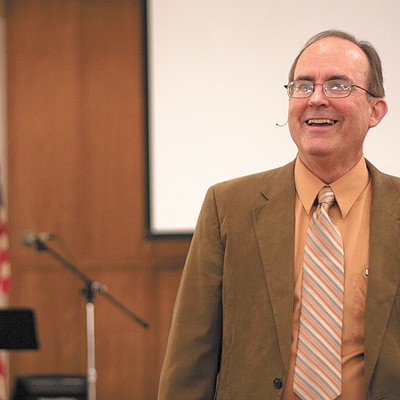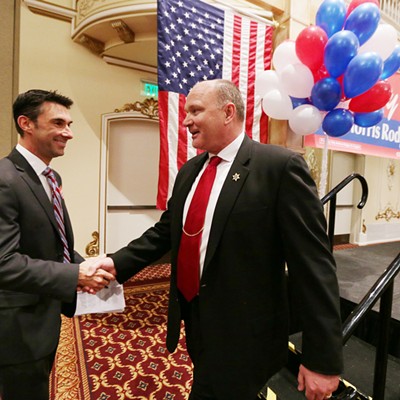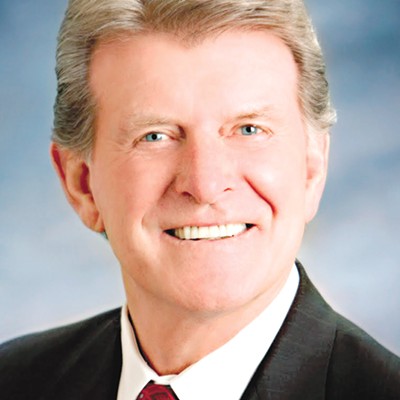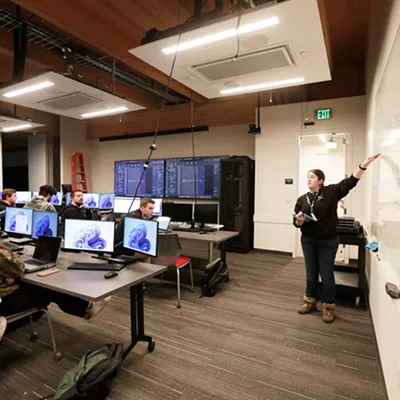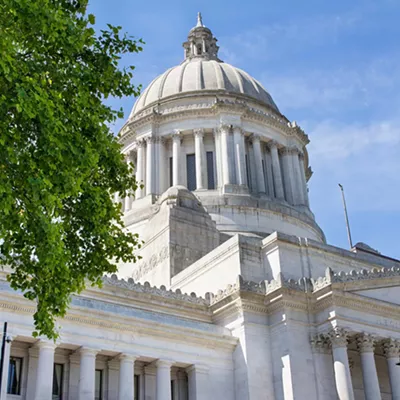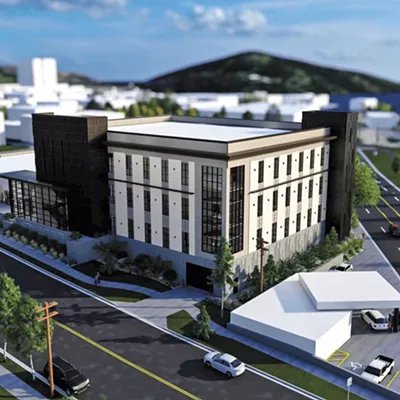The video camera peers out behind a ketchup bottle at Darcy's Restaurant as Rep. Matt Shea, flag pin on his lapel, builds to a crescendo.
It's April. Shea has just returned from Nevada, where he'd joined a throng of militiamen, protestors and legislators supporting rancher Cliven Bundy in his standoff with the Bureau of Land Management. The military veteran waxes eloquent about the Founding Fathers, sacrifice, courage and the patriots who stared down the feds.
"They stood the line when everybody said they were 'radical' and that they were 'domestic terrorists.' And you know what happened, when we stood united on principle and didn't waver? We won and those tyrants tucked tail and they ran," Shea says, his finger thrusting into the air. "And that's the way it's supposed to be in America! They're supposed to be afraid of us and not the other way around!"
Josh Arritola, Shea's 4th District election opponent, is a different sort of Republican. It's September. Standing before a crowd of union nurses protesting Eastern State Hospital's staffing shortages, Arritola stands holding a megaphone. "My wife is a cardiothoracic ICU nurse out in Kootenai, and so we're really proud to be supported by nurses," Arritola says. "And as you stand with us, we're standing with you."
It's an unusual sight: A right-to-work-supporting Republican, in one of the state's most conservative districts, telling a union he stands with them.
It's October. The room is packed and the crowd, brandishing shamrocked Matt Shea badges and red Josh Arritola stickers, boos and applauds as the two men toss barbs back and forth. The debate echoes a dichotomy of their previous speeches: Shea is either a truth-telling soldier standing up for liberty or a paranoid, with-me-or-against-me extremist. Arritola is either a solid Republican who's willing to respect people he disagrees with or a RINO, a Republican in Name Only.
The division that has simmered behind closed doors for years in the local Republican Party has finally boiled over.
Loyalists and patriots
In March, local Republicans of all stripes gathered in the Spokane Public Library for a meeting aptly called "Let's Stop Promoting Division in the Party."
But as the campaign has unfolded, Shea has framed the race as a clear division between true conservatives and "fake conservatives."
"We have to deal with fake conservatives, that are bought and paid for by the Karl Rove establishment," Shea tells a crowd in Post Falls. "Unfortunately, some in my area have recruited a primary opponent against me."
When Arritola talks policy, however, he doesn't sound like a Democrat, or even a moderate. Arritola, a business consultant and former Air Force second lieutenant, espouses many of the same hard-line views as Shea on the Affordable Care Act, gas taxes, global warming and abortion.
"I would consider myself a pragmatic conservative," Arritola says. He says he focuses on issues like overhauling the foster care system rather than, say, Shea's interest in gold and silver currency.
But in emails to supporters, Shea argues that Arritola is a Democrat in Republican clothing. Shea circles a screen-shot image of Arritola's donations from liberal unions, highlights Arritola being photographed beside Democrat Sally Jackson and exposes Arritola's Facebook friendship with former Shea opponent Amy Biviano.
After all, Shea paints the world in clear dichotomies between heroes and cowards, tyrants and freedom fighters. ("Are you a loyalist or a patriot?" Shea asks in speech after speech.)
"I would never accept the help from folks like SEIU Healthcare, or prominent 'Pro-Choice' liberals because I need resources to help spread my campaign message — BECAUSE IT'S NOT THE RIGHT THING TO DO," Shea writes.
Arritola shrugs off the criticism. "I'm not afraid of liberals," Arritola says. "I don't agree with Sally Jackson. That's OK. This is a bipartisan effort to get rid of Matt Shea."
If anyone recruited him, Arritola says, it was Shea. When he learned he was living in Shea's district, he wanted to challenge him. "He's very well known in the media," Arritola says. "He has a reputation."
Shea has lashed out at the media, condemning its coverage of his messy divorce and a road rage incident where he pulled a loaded handgun. For this story, he spoke to the Inlander by phone, but for years he hasn't spoken to the Spokesman.
What bugged Arritola most came straight from Shea's mouth: Last year, Shea stood on a truck bed in North Idaho and said, as an elected official, that economic collapse is inevitable.
"We should look at [the collapse] as an opportunity, not as something to be afraid of," Shea said. He urged his audience to study small-unit tactics, to stock up on food, water and seeds — and more than 10,000 rounds of ammunition.
It's simply about self-reliance and preparation, Shea says.
"It was nothing 20 or 30 years ago to walk into my grandmother's pantry, and see it stocked full of food," Shea tells the Inlander. "And I also know she had the ability to defend herself, her home and her neighborhood, in the event of a crisis."
But Arritola sees Shea as fearful, distracted from issues more relevant to his district. Arritola lugs a handmade, life-sized Shea cutout named "Flat Matt" to the many candidate forums Shea doesn't attend, and points out fringe events that Shea attends instead.
Many far-right audiences love Shea: Former Bonner County Commissioner Cornel Rasor introduces him as "the very best state legislator in the United States." Judy Crowder, district leader for the John Birch Society, calls him a "modern-day Thomas Jefferson."
Yet other conservatives, like former Spokane City Councilwoman Nancy McLaughlin, argue that Shea "has had opportunity to help unite the party and had succeeded in doing just the opposite."
Arritola has racked up some big-name Republican endorsements, including Spokane County Sheriff Ozzie Knezovich, former Attorney General Rob McKenna, former U.S. Rep. George Nethercutt and former state Rep. Lynn Schindler. Shea has stepped on plenty of Republican toes: Knezovich says Shea lied to him, while County Commissioner Todd Mielke recounts Shea demonstrating "spontaneous, extreme anger" at him.
Some conflicts have cooled. The late Sen. Bob McCaslin once wrote, "I wish to state that under no circumstances would I support Matthew Shea for any public office."
But his son, Bob McCaslin Jr., says Shea has been able to explain the conflict with his dad to his satisfaction. Shea and McCaslin Jr. have endorsed each other in their respective 4th District races.
"I try to work with people to help their constituents whenever I possibly can," Shea says.
But Shelly O'Quinn, the Republican county commissioner, says that hasn't included her. She says emails, phone calls, conversations and intermediaries haven't convinced Shea to meet with her.
"I have a standing invitation. It's been almost two years," she says. "He's never forgiven me for running against John Ahern [in 2010]."
"The ability to compromise"
Arritola argues that Shea's goals and tactics have had serious consequences for projects like the North Spokane Corridor. "You can't point to anything he's accomplished with major projects," Arritola says.
Arritola admits his claim that Shea's poor representation forced the city of Spokane Valley to hire a lobbyist was wrong, but says many in the Valley agree that Shea is ineffective.
"He hasn't done a doggone thing, as far as I'm concerned, for this city," Spokane Valley Councilman Chuck Hafner says. "He took credit for helping with the [Sullivan] Bridge, but I don't think he did a thing for the bridge."
Valley Councilman Rod Higgins firmly disagrees. He says Shea worked to find funding, but was unsuccessful because of education funding mandates. He thinks Shea's lower-taxes, less-government philosophy reflects the views of the Valley.
"I have the most conservative voting record in Washington state according to the Washington Conservative Union," Shea says proudly.
The past two years, Shea's voted nay twice as often state Rep. Kevin Parker, and on nearly 200 occasions more than Rep. Jeff Holy. Dozens of times, Shea has been one of only a few opposing nearly unanimous bills, because they don't meet his strict criteria.
When Parker pushed a bill allowing the homeless to list the address of a shelter on job applications, for example, Shea voted against it, believing it could raise the risk of voting fraud.
"Is it constitutional?" Shea says he asks about each bill. "Can it be done in the private sector? ... Will there be any government competition with the private sector? ... A lot of these bills are not constitutional."
Asked about working with Shea, outgoing 4th District Rep. Leonard Christian laughs wryly. "You don't work with Matt Shea," says Christian. "You either do what he tells you, or he hates your guts."
But many of his other colleagues have endorsed him. Holy celebrates Shea's savvy, behind-the-scenes efforts to stop firearm background-check legislation. Sen. Mike Padden says Shea has learned lots about politics, relationships and working with others. "He's matured the last few years," he says.
"He's moved a lot of legislation," Sen. Michael Baumgartner says. And in a House controlled by Democrats, Baumgartner says, you can't move legislation if you can't work with Democrats. With Democratic support, Shea has changed motorcycle regulations and loosened restrictions on constructing small docks. He passed a bill allowing all-terrain vehicles to travel on more roads — though Arritola argues that any benefits were counteracted by tacked-on fees and regulations.
Shea co-sponsored a bill regulating drones, which passed resoundingly before falling to the governor's veto. Shea sees these as examples of how he's built diverse coalitions around his "Freedom Agenda" without giving away an inch of principle.
Hence, another Matt Shea proverb: "Leadership is not the ability to compromise. It's the ability not to," he tells the crowd of Oath Keepers. "Amen?" ♦
Candidate Q&A
If elected, what will you work to accomplish in the Legislature next session?
Matt Shea (Republican): I will build on the legislative achievements of the Freedom Agenda. It is the most successful slate of conservative legislation that has become law in over two decades. The Freedom Agenda had over 50 Democratic co-sponsors showing that building coalitions around issues of principle works in Olympia. We’ve successfully brought legislation, or amended legislation, to: stop gun control, reduce taxes (like preventing a “fuel tax” increase), reduce regulation, and protect property rights. A major policy priority will be to finish the push to legalize industrial hemp, which will revive our state’s pulp and paper industry, have a positive economic impact estimated in the tens of millions of dollars, and create hundreds of jobs.
Josh Arritola (Republican): I will work on finding a way to fund the completion of the North Spokane Corridor without raising taxes. Work to reduce business regulations and force regulators to move faster and change their model to one of a business/customer support model.
The Legislature is obligated under the state Supreme Court to fully fund K-12 education by 2018. How can the Legislature keep good on this promise while facing a projected budget shortfall? Would you support any plans for increasing the state’s revenue?
Shea (R): I would not support any plans to increase state revenue — for any reason. In reference to meeting funding targets for education, in the legislature I have championed “unfunded mandate: reform, which would protect the school districts from having to spend unplanned sums complying with unnecessary or duplicative regulatory burdens or administration instead of putting that money to use in the classroom. I also believe (and have supported legislation and rule changes to this effect) that we could, and should, prioritize funding education first in the budget process to address the needs of our students, teachers and school districts.
Arritola (R): I would not support increasing taxes. The state currently wastes $2.9 billion in the Department of Transportation and $3 billion in the Department of Health and Human Services. I believe we can work with the WEA to force reforms in these departments and move some of that money to education and some to tax cuts.
Without additional sources of revenue, state agencies will be forced to cut funding to balance the 2015-17 budget. In your opinion, which programs and services can afford these budget reductions? On the other hand, which programs and services would you strive to protect from these cuts?
Shea (R): The House Republican Caucus has submitted a plan — a responsible budget — to fund government programs and services, reduce spending (by eliminating administrative regulations), and all without raising taxes. I continue to support that plan.
Arritola (R): I would like to see the Department of Ecology and Labor and Industries closed. They are extremely hostile to businesses/job creation. I would like to protect the money being used on foster care and adoptions. I do not believe these areas can take cuts.
Would you support Gov. Inslee’s proposed carbon emissions tax and/or cap-and-trade system? If not, what, if anything, should Washington do to cut greenhouse gas emissions in order meet the carbon-emissions reduction targets set by the Legislature in 2008?
Shea (R): I do not support Gov. Inslee’s proposed carbon emissions tax. I further oppose any kind of regulatory tax or fine that would be targeted at businesses. Washington’s top environmental challenge is the restriction of businesses in the free market from contributing their own resources, practices, and innovation in maintaining a healthy and clean environment. It is haphazard to assert that government has all the answers, and that those answers need to be implemented — at the cost of jobs — without the advice and eager participation of businesses.
Arritola (R): No. We need to focus on clean lakes and rivers.
As Washington faces a looming doctor shortage, Washington State University is asking the Legislature for $2.5 million to establish its own medical school. Would you support this request from WSU? If not, what’s your plan for filling this growing need in our health care industry?
Shea (R): I recognize the need to address the growing needs of our state’s healthcare industry, and I would support the request from WSU for $2.5 million, provided that the money comes from the capital budget and further provided that the capital budget does not use any money for further land purchases when we cannot maintain what we already have.
As the recreational marijuana industry continues to grow, what reforms would you support to the medical and/or recreational markets?
Shea (R): The marijuana industry needs dramatic reform — specifically, medical marijuana. The latter industry needs concrete definitions — specifically in how it is prescribed and distributed. I believe that cross-pollination prevention needs to be addressed in regards to industrial hemp. Finally, the current tax structure for both marijuana industries is unworkable; I believe that a portion of the revenue collected should be given back to the local level. As a member of the House Government Accountability and Oversight committee, I have been working to address these issues as they have been brought before the legislature.
Arritola (R): Expanding schools does not mean doctors will chose to stay here. Washington state is very unfriendly to doctors and nurses. From cutting hospital reimbursement due to Obamacare cuts to forcing several doctors out of the exchanges. In Alberta, Canada, their medical school saw 100 percent of graduating doctors leave Alberta for the United States. We will continue to see doctors and nurses chose to practice their trade in other states that are not hostile to them.
After accepting $8.7 billion in tax breaks, Boeing recently announced it will move 2,000 jobs to Oklahoma City and St. Louis. What incentives should Washington offer to big businesses to keep them from moving jobs out of state?
Shea (R): Washington should offer comprehensive tax reforms — lower rates — for all companies and industries, while eliminating as many unnecessary regulations as possible. The fact that Boeing left – even after the “bailout” passed the legislature — shows that other states are more competitive economically, and it should serve as a wake-up call to our state government that the existing tax codes will not attract new business, and that businesses will continue to leave this state.
Arritola (R): We need to leverage our strengths and work hard at keeping businesses here in Washington. While Matt Shea voted against keeping Boeing here, I will vote for keeping every company here. We must accept the current realities for what they are and realize we are competing with other states for these jobs. Washington state is not entitled to these businesses staying here — we have to earn it. It’s called the free market.
Here at the Inlander, we’ve written extensively about the cracks in our mental health system. Our stories have touched on the burden of mental illness on the criminal justice system, punitive conditions at Eastern State Hospital, psychiatric boarding, and the difficulty of getting care in rural areas. What specific steps would you support to improve mental health care in Washington?
Shea (R): Article 13 of our state Constitution requires us to address mental health. Re-prioritizing the budget to address mental health, using already established groups of mental health professionals to provide solutions, removing regulations and policies that are creating an untenable system, addressing the rural healthcare doctor shortage as mentioned above, and allowing free market competition (in place of the Affordable Care Act) would provide real solutions and reform to improve mental health care in this state.
Arritola (R): Supporting nurses. Nurses provide the lion's share of care to patients and cutting nurses to the point where both the nurses and the patients are in danger is stupid. Nurses at Eastern State Hospital are being assaulted because of our poor funding for nurses. As Obamacare becomes more and more expensive, we have to protect nurses from being pushed outside the state because we cannot even provide a safe work environment.




